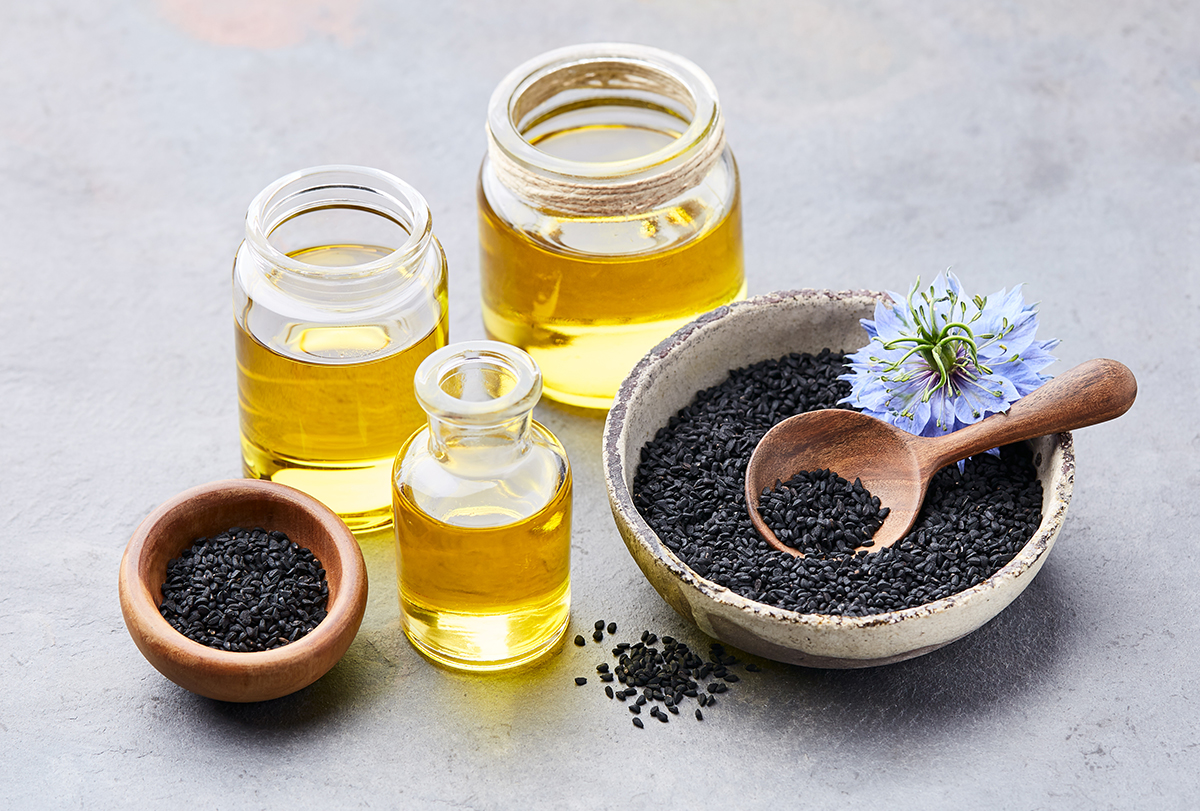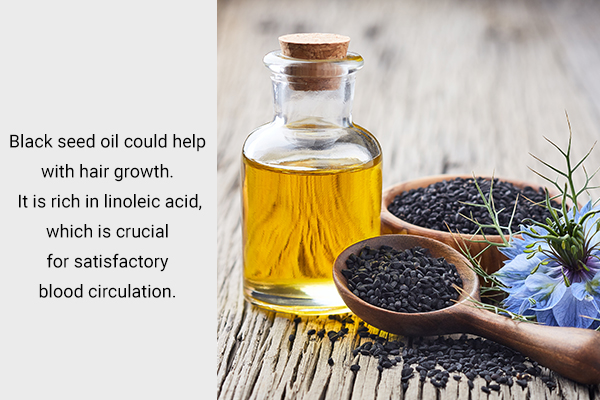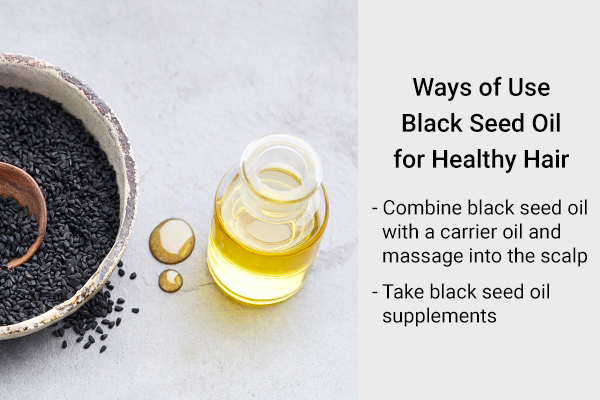In this article:
Black seed oil, also known as kalonji oil and biologically termed Nigella sativa oil, is native to Africa and Southwest Asia and is a natural remedy with a plethora of health benefits. This oil is rich in essential fatty acids, vitamins, and minerals such as calcium, iron, and potassium. (1)

Black seed oil promotes healthy skin, boosts the immune system, and also has benefits for hair.
This article will analyze the different uses of black seed oil for your hair.
Hair Advantages of Using Black Seed Oil
Black seed oil can be a great solution for multiple hair issues.
1. Fights scalp inflammation such as psoriasis and eczema
Black seed oil has an anti-inflammatory action that combats the symptomatic distress linked with inflammatory disorders. (2) This hints at its possible use for treating inflammation associated with eczema, psoriasis, and other scalp infections. (3)
In one study, the application of black seed oil to an affected area significantly reduced psoriasis-like inflammation and improved its associated skin changes. Thus, it can be inferred that black seed oil can be effectively used along with other topical treatments for psoriasis. (4)
According to research, Nigella may be as effective as betamethasone (medicine for skin infection) in reducing the severity of hand eczema and improving the quality of life of individuals with eczema. (5)
2. Improves hair texture and adds shine
A research article suggests that hair care products such as shampoo and oil containing black seed can provide comprehensive hair care by enhancing the shine, texture, and volume of hair, reducing hair problems, and making hair stronger and shinier. (6)
3. Promotes hair growth

According to a study, Nigella sativa could help with hair growth. It is rich in linoleic acid, which is crucial for satisfactory blood circulation.
The solution, made with coconut oil and Nigella sativa oil, was applied three times a day to a shaved scalp, and it was found to be effective in promoting the overall growth of hair. (7)
4. Combats hair fall
A study showed that an herbal hair oil made with black seed oil helps reduce hair fall. In the study, the hair fall reduced gradually over 90 days, reaching 0% by the end of the period.
This result indicates that the use of the experimental herbal hair oil such as Nigella oil can be effective in reducing hair fall. (8)
5. Fights telogen effluvium
Telogen effluvium (TE) is a condition that causes hair thinning or shedding. Black seeds have anti-inflammatory and antioxidant properties that may be beneficial in treating TE.
A study showed that 70% of the patients treated with black seed oil experienced significant improvement in their hair condition, and there was a significant increase in hair density and thickness. The black seed oil also lessened the inflammatory response in most of the patients who had TE.
Therefore, the study suggested that black seed oil could be useful for treating TE. (9)
How to Use Black Seed Oil to Improve Hair
Black seed oil can be utilized in a lot of different ways to promote healthy hair growth. Here are some of the methods of using black seed oil to improve your hair condition.

1. Massage into the scalp
The easiest method to utilize black seed oil is to massage your head with it. Here’s how to do it:
- Combine black seed oil with a carrier oil (such as coconut oil and olive oil).
- Apply the mixture to your scalp.
- Massage gently.
- Leave it for approximately 1 hr.
- Wash it off with your usual shampoo.
You can also add a few drops of black seed oil to your regular shampoo to get its hair benefits.
2. Take black seed oil supplements
If you wish to take black seed oil orally, you can simply get and take Nigella sativa oil capsules (500 milligrams) every day for around 2 months.
However, it is important to speak to your doctor first before taking any supplements orally, especially if you’re pregnant or have chronic illnesses.
Side Effects of Black Seed Oil
When you take black seed oil supplements by mouth, it’s mostly smooth sailing with no severe side effects. However, a few people who took 5 mL/day experienced mild discomfort such as feeling queasy or bloated or having a burning sensation.
When it comes to putting black seed oil on your skin, some people may experience a severe allergic rash. So, it’s always a good idea to patch-test a tiny area of skin first to see if it agrees with you. (10)(11)
Most-Asked Questions About Black Seed Oil
What is black seed oil?
Black seed oil is taken out from the seeds of the Nigella sativa plant, which is found in Southwest Asia.
How should I utilize black seed oil?
Black seed oil can be utilized by taking it via the oral route or by applying it to the skin.
Where can I purchase black seed oil?
Black seed oil can be found at health stores, online vendors, and grocery shops. It is important to look for a reputable brand and to check the label for purity and potency information.
Final Word
Black seed oil benefits the hair by reducing scalp inflammation, promoting hair growth, improving hair texture and adding shine, and treating hair fall and telogen effluvium. It can be used both topically and orally.
Black seed oil can be purchased at health food stores, online retailers, and some grocery stores. Patch-testing before topical use is recommended to check for allergic reactions.
- Was this article helpful?
- YES, THANKS!NOT REALLY


